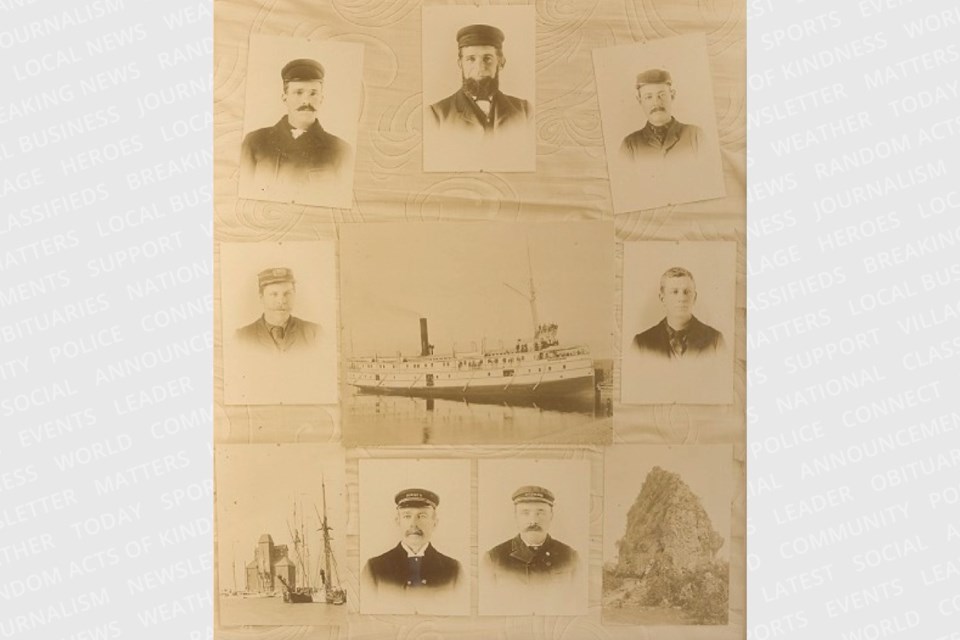On Sept. 10, 1915, in Collingwood, a 69-year-old man died from natural causes.
At first glance, this fact doesn’t sound terribly newsworthy, but to know his story is to wonder how he made it to that age in the first place.
His daughter, Agnes ‘Aggie’ Dyment, of Barrie, was able to attend her father’s funeral. The children of Great Lakes mariners did not always have that privilege — no funeral service, no headstone to visit, as their fathers, in many cases, had been lost to the cold lake water.
This tale was inspired by one of my favourite things — a reader’s comment. My thanks go to Cindy, who, after reading the recent ‘Peril on the lakes’ columns, suggested I have a look at the exploits of Capt. ‘Black Peter’ McLean Campbell.
Campbell, I discovered, was larger than life. My account can in no way do him justice as his life story can barely be touched upon within these paragraphs. He was a living, breathing book, perhaps a movie or documentary series.
The captain’s people came from Tiree, a small, treeless island off the west coast of Scotland. Capt. Peter Campbell’s father settled on Cape Breton Island by the early 1830s and married Margaret Ferguson soon after. Their son, Peter, was born there in 1845.
The 1860s found the Campbells farming in Bruce Township, partway between Kincardine and Port Elgin. Young Peter had a different life in mind and was soon serving his time before the mast. The water of Georgian Bay was calling him.
Campbell, an adventurous, natural seaman, began his storied career in a time when the schooner days were giving way to the steamship era. When not guiding lake vessels to earn his pay, he was racing them.
The young mariner had business sense as well. Barely out of his teens, Campbell started to work for the James and William Beatty shipping company and was put in charge of the steamer Waubuno. A few years later, he left his employers and formed a syndicate with a group of lumbermen, railwaymen and other investors.
The company purchased the river steamer Gladys in 1875. They had her refitted for passenger service on the lakes and renamed her Northern Belle. Campbell was her first captain in 1877.
This was only the beginning. A person would need a spreadsheet to keep track of all the ever-changing business alliances in the Great Lakes shipping industry and to follow which steamships were in any given fleet.
Campbell’s conglomerate, known by 1880 as the Great Northern Transit Company, eventually purchased the Waubuno. This steamer, built in 1865, was the source of one of Campbell’s first close calls. A fire broke out on board and, although it looked quite serious for a time, the flames were successfully doused.
By 1879, the Waubuno was in the hands of the Georgian Bay Transportation Company. At the end of that year, the company could see its vessel was near the end of her usefulness and made plans to replace her in the spring.
Eerily similar to the tale of the demise of the J.H. Jones, the Waubuno set off on her planned final run of the year, on a November day, with a storm approaching. She was lost near Parry Sound on Nov. 22 with 24 souls on board.
In 1880, the Great Northern Transit Company purchased a new steamer and put Campbell in her captain’s chair. This would not be Campbell’s last posting, but it would certainly become his most talked about.
In May 1882, as lunch was being served to officers and crew, a coal oil lamp fell and smashed in the lower engine room of the two-year-old steamer Manitoulin. The explosion that followed had everyone running for the lifeboats.
Each week, the Barrie Historical Archive provides BarrieToday readers with a glimpse of the city’s past. This unique column features photos and stories from years gone by and is sure to appeal to the historian in each of us.



